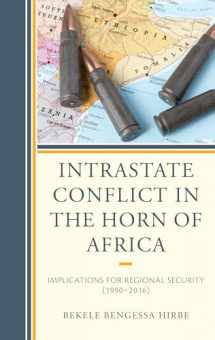
Intrastate Conflict in the Horn of Africa: Implications for Regional Security (1990–2016)
Book details
Summary
Description
Review
"The major source of intrastate conflict ... is political marginalization of disadvantaged ethnic groups," writes the Ethiopian author of this trenchant and timely study, appearing as it does during a year in which the Ethiopian state has forcibly suppressed the separatist ambitions of its Tigrayan people. Tigrayans previously ran the nation (from 1991 to 2018), whereas now the Oromo do, leading to Tigrayan marginalization and an ongoing civil war. Parts of this book deal directly with the origins of Tigrayan/Oromo hostility. The author (who once served as his country’s ambassador) discusses theories of intrastate conflict and how they apply especially to the Horn of Africa countries (Eritrea, Ethiopia, Djibouti, Somalia, and Somaliland, but not Sudan or South Sudan). Much of the book’s discussion concerning how to resolve conflicts in the region derives from a series of in-person and Skype interviews. A chapter on conflict resolution in the Horn of Africa countries rates the "actions" (meaning the abilities) of each nation to engage in effective efforts for conflict mitigation. One chapter rates sources of conflict within each state, and another provides historical background on the various wars of the region, nation by nation. Overall, bad governance has proven to be the major cause of these conflicts. Summing Up: Recommended. Graduate students and faculty. ― Choice
Focusing on the major causes of interstate and intrastate conflicts in the war-ridden region of the Horn of Africa, Bekele Bengessa Hirbe provides a serious and much needed scholarly analysis of the dialectical connections between interstate conflicts and ethno-class contradictions in Ethiopia, Eritrea, Somalia, and Djibouti. Specifically, Hirbe identifies and explains the central problems in the Horn as the absence of democracy and good governance and their far-reaching consequences. He critically exposes the relationships between global powers and countries in the Horn and the attraction and involvement of these powers in this troubled region. This is a must be read book for students of African studies and international relations as well as scholars, politicians, and policy experts who are interested in addressing the human tragedies of dictatorship, ethno-national hierarchy, and war in the region. -- Asafa Jalata, University of Tennessee-Knoxville
This book identifies the most important sources of intra-state conflict in the individual countries of the Horn of Africa. It explores how serious the threats are to the security of the states and their people; the region; and it identifies the appropriate conflict resolution approach.
Hirbe indicates that the political marginalization and discrimination by the dominant ethnic group in power against the members of disadvantaged ethnic groups is the most important source of intra-state conflict. His findings demonstrate that the authoritarian states in the Horn of African countries are the major source of threats to individual security. Moreover, the security of the states in the region are closely interlinked; their national securities cannot be considered apart from one another.
The book notes that the realist-militaristic, zero-sum game conflict resolution approach dominates the behavior of most parties involved in intra-state conflict in the Horn of Africa. However, different conflict resolution approaches could be effective and appropriate to resolve the intra-state conflict in each individual country: the traditional bottom-up approach in Somalia, Power Sharing through the Ethnic federalism in Ethiopia, and Encouraging Good Governance in Eritrea and Djibouti.


We would LOVE it if you could help us and other readers by reviewing the book
Book review



